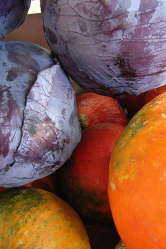CBC Series on Hospital Food -- Longer Post
 Wednesday, January 9, 2008
Wednesday, January 9, 2008 Here are a few more details about and page links from this series I posted about earlier today:
Monday January 7 - Hospital Food - A patient's story (21:58)
Sounds Like Canada Producer Jason Proctor lays out his reasons for launching this series about hospital food. It all stems from the time when his mum was sick in hospital with cancer, and despite her greater worries about her illness, the food was one of the things she complained about the most.Tuesday January 8 - Behind the Scenes at Two Hospital Kitchens Continuing our series about the state of hospital food in Canada - we take a backstage tour of hospital kitchens across the country - from Grand Manan to Edmonton. And depending where you are - there's a lot of variety on those food trays - from fish caught fresh off the dock to reconstituted, "re-thermalized" soup flown in from afar. We'll lift the lid and see what's for lunch - Tuesday on Sounds Like Canada.
Wednesday January 9 - Hospital Food Experts Panel
Shelagh Rogers speaks to a panel of people who've dealt with hospital food on the frontlines: Darlene Ravensdale is a dietician. Brad McKay is C.E.O. of Ottawa Hospital Food Services. And Dr. Brian Goldman is the host of White Coat Black Art here on CBC radio, and he practices emergency medicine at Mt. Sinai in Toronto. A lively discussion about the challenges of feeding healthy food to hospital patients.
Here from the web page is the state of the "manifesto behind the movement", the evolving Hospital Food Bill of Rights:
1. "... the right to tasty and nutritious food - plain and simple!" - Judy McLaren
2. "...Our tax dollars pay for health care and I believe that we should expect "quality" service and food." - Carole Findlay
3. "When a family is going through a crisis, good nutrition should be a part of the healing process. " - Berni Harley
4. "Hospitals should be making good quality vegetarian meals that would offend no one's culture."
5. " The food should be fresh and colourful and make people feel better." - Cathy Flannagan
6. "Specialised food for specialised diets should be appetizing." - Darlene Ravensdale
Well worth reading are all the listeners' comments on hospital food. Here are a few:
"...In defence of Hospital Food I have to tell you the food in our small rural hospital is wonderful. Staff and patients all eat the same thing. It is cooked from scratch by wonderful cooks and it is like eating at home. Fresh muffins in the morning-toast that isn't soggy and Cottage cheese fruit plates for the evening meal-to mention a few. However I can't tell you where we are because if our Health authority were to find out they would probably make cut backs to save money and our wonderful food would be gone. We don't want to be like the big city hospitals so I am remaining incognito."
"...I have watched the steady deterioration of hospital food. The salt-water soups, the grey meat and veg, the jello/ice cream desserts. In the hallowed name of economy, hospitals in BC are having meals made, then frozen and shipped to them from Ontario. How that can be cheaper, I do not know. My father-in-law was in hospital for months before he died. The worst 'food' he was given was soggy, cold toast in a plastic bag for breakfast - toasted in Ontario, frozen and bagged, then nuked in Victoria and served up 1/2 hour or more later. Has the world gone mad?"
"... Back in 2005 I was amazed at the food my Japanese wife was given while she was in the hospital after our son Tomo was born. The food arrived in a large machine that kept one side of each meal tray heated and the other chilled - the two sides separated by an insulated divider. Several of the meals were special "hearty" meals to help in recovery. These filled two trays. I attach a few photos - you can see the delivery machine, one of the double-tray meals, and a few details showing some of the individual dishes. Not only was the food delicious (Noriko generously let me taste), but its presentation was so appetizing."
I'm both encouraged and disheartened by this series. Encouraged that the CBC is raising public awareness and stimulating discussion about the importance of good food and nutrition in illness but very discouraged about the state of hospital food services as perceived by Canadians. Today, there are 22 comments: half are negative with valid criticism -- not just whining about not getting food preferences. I was heartened to read the positive comments, but must truthfully disclose the really good reports are about hospital experiences in other countries (Italy, Japan).
This is a very valuable series for dietitians working in hospitals. Thanks, CBC.


